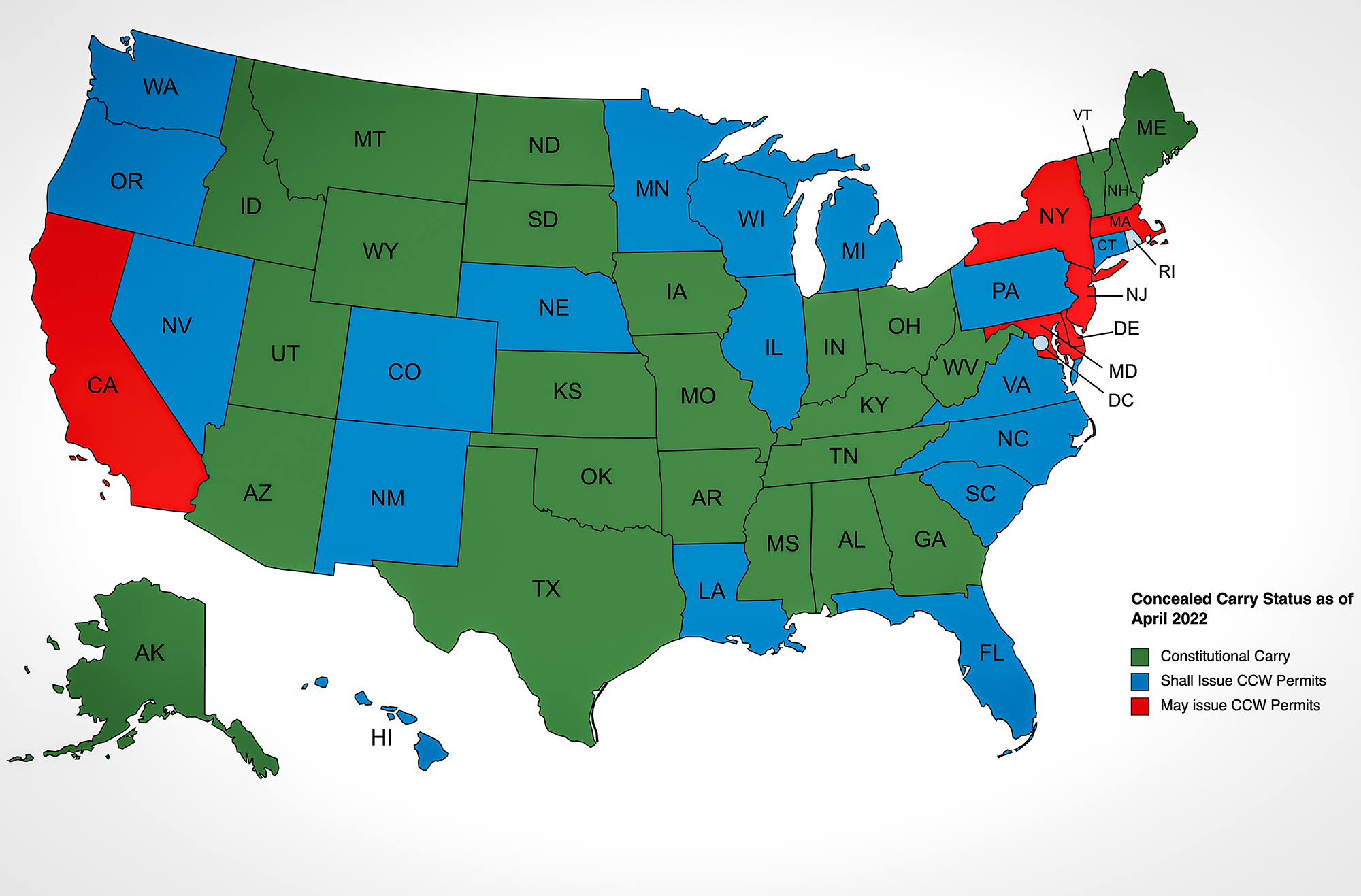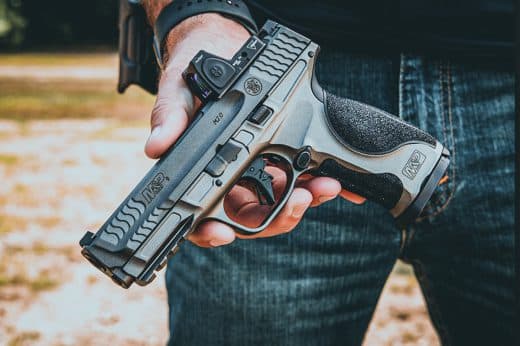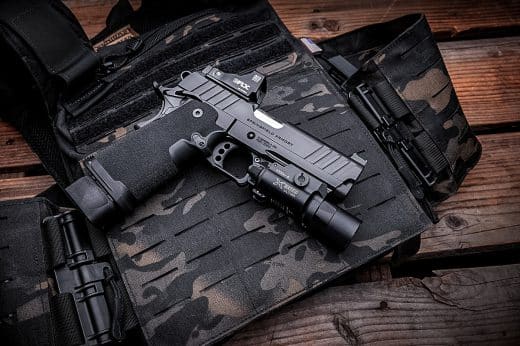With the Supreme Court expected to deliver a pivotal decision regarding concealed carry in the NYSRP v. Corlett case, President Joseph Biden hurtling headlong into restricting firearms by changing ATF rules and regulations regarding so-called “ghost guns,” and anti-gun states passing more anti-gun laws, something extraordinary has happened. As of this week, half the states in the country are now constitutional carry states, meaning they have adopted permitless carry laws. Legally own a gun; legally carry a gun.
Back in 2015, there were only a few states with permitless carry. Constitutional carry (con carry) laws were introduced and defeated in 15 states that year in what anti-gun organizations hailed as a sizeable victory.
In the years since, most of those states have adopted constitutional carry laws, with Georgia’s governor signing its con carry law this week, becoming the 25th permitless-carry state. All this as Biden calls for “assault weapon” and “high-capacity” magazine bans while introducing restrictions on “ghost guns” and a controversial nominee for director of the ATF.

But as Georgia celebrates a gun-rights win and the prospect of constitutional carry in Louisiana appears to be a possibility again, a con carry bill recently failed in the Nebraska state Senate, slowing down the train a bit.
Of the 15 states that failed to see the light in 2015, 11 of them have come around. Here’s where they all stand in the wave of constitutional carry legislation currently sweeping the country.
RELATED – Biden Announces Strict ‘Ghost Gun’ Regs, Atf Director Nominee
Georgia Constitutional Carry Signed Into Law
This week, Georgia Gov. Brian Kemp signed a bill that allows state residents to carry concealed without a license or permit. Kemp also signed a measure that allows concealed carry permit holders from other states to carry in Georgia.
The state Senate passed the Constitutional Carry Act in early April, after which it went to Kemp’s desk.
“SB 319 makes sure that law-abiding Georgians — law-abiding Georgians, including our daughters and your family too — can protect themselves without having the permission of the state government. The constitution of the United States gives us that right, not the government,” Kemp said. “HB 218 ensures that individuals who are licensed to carry in another state are also authorized to do so here in Georgia.”
Georgia has become the 25th state to adopt a constitutional carry law.
Previously, state residents had to obtain a Weapons Carry License (WCL) to carry concealed in public, which they applied for through their county probate court. Applicants must pass a background check, pay a $75 fee, and be fingerprinted.
Under the new law, convicted felons and anyone legally prohibited from possessing a firearm are prohibited from carrying one.
RELATED – Indiana Joines Alabama and Ohio as Newest Constitutional Carry States
Colorado Remains Shall-Issue
Colorado remains a shall-issue concealed carry permit state for residents 21 and older.
Permits are issued by a resident’s county sheriff and are valid for five years. Applicants must pass a training class or otherwise demonstrate their competence with a handgun to qualify for a permit. The state’s Concealed Carry Act allows permitted persons to carry in “all areas of the state” except some federal prisons, K-12 schools, and buildings with fixed security checkpoints like courthouses.
Indiana Adopted Constitutional Carry This Year
In March, Indiana Gov. Eric Holcomb signed the state’s constitutional carry bill (H.B. 1296) into law, granting residents 18 and older and legal gun owners the right to legally carry a concealed firearm without possessing a permit, paying a fee, or receiving permission from authorities.
The law goes into effect on July 1. Residents will still be able to obtain a carry permit for carry reciprocity purposes in other states. Indiana became the 24th constitutional carry state with the passage of this legislation.
RELATED – RBT Chief Heads to Capitol to Fight ATF Attacks on FRT Devices
Iowa Passed its Constitutional Carry Bill in 2021
Iowa became a constitutional carry state in 2021 when it adopted a law allowing adults 21 and older to carry a concealed handgun in most public places without a permit. Gov. Kim Reynolds signed the law in April.
Anyone who is prohibited from owning a firearm is, of course, prohibited from carrying one, and any resident under the influence of drugs or alcohol or in possession of drugs or alcohol is prohibited from carrying. Permits are still obtainable upon request.
Minnesota Is Still Shall-Issue
Minnesota remains a shall-issue concealed carry permit state for eligible residents 21 and older. The state also issues non-resident carry permits.
Permits are issued by the county sheriff, who must do so within 30 days of the submission of an application. A permit is valid for five years. Emergency 30-day permits are also issued. A sheriff’s department that wrongfully denies an applicant (as determined by a court) is responsible for reimbursing the applicant’s legal fees. Applicants must be at least 18 and a legal gun owner and must not be listed in the criminal gang investigation system. They also must present evidence of training in the safe use of a pistol.
Missouri Has Had Con Carry Since 2017, Despite Vetos
Missouri is a constitutional carry state, and it still issues carry permits (to residents 19 and older) for reciprocity reasons and for legal open carry in locations where concealed carry is restricted. Missouri doesn’t require any type of permit or licensure for gun purchases or ownership and is a castle doctrine state.
Gov. Jay Nixon vetoed two constitutional carry bills in Missouri in 2016. when the Missouri Legislature reconvened for a veto-override session on Sept. 14, 2016, the Senate voted 112-41 to overturn the veto. Permitless carry went into effect on Jan. 1, 2017, and instituted a de facto elimination of the minimum age for concealed carry.
RELATED – The ATF’s Renewed War on Forced Reset Triggers
Montana Has Had Constitutional Carry for Over a Year
Montana’s constitutional carry law went into effect on Feb. 18, 2021.
Open and concealed carry are allowed without a permit, but if one wants to obtain a permit for reciprocity purposes or for other reasons, they must receive required training.
As of June 1, 2021, concealed and open carry are allowed at all public institutions in Montana, including colleges and universities. The law is currently being challenged by the Office of the Commissioner of Higher Education as a violation of their authority.
Nevada’s Carry Permits Are Issued by County Sherriffs
Nevada remains a shall-issue concealed-carry state after its con carry bill failed in 2015. A resident’s county sheriff shall issue a concealed carry permit to all applicants who are 21 years old and qualify under state and federal law and submit an application in accordance with state rules.
Applicants must also complete an approved course in firearm safety and qualify with a handgun.
New Hampshire: A Constitutional Carry State for 5 Years
New Hampshire adopted its con carry legislation on Feb. 22, 2017, requiring no license or permit to carry open or concealed in public. As is common, New Hampshire still issues carry permits for the purpose of reciprocity with other states.
Permits cost $10 for residents and $100 for non-residents and are valid for five years. Interestingly, New Hampshire has no laws stating a minimum age for residents to possess or carry firearms.
South Dakota Has Permitless Carry AND Free Permits
In 2019, South Dakota Gov. Kristi Noem signed a law that went into effect July 1 of that year that allows any individual 18 or older who can legally possess a firearm under state and federal law to carry a concealed handgun without a permit or license.
As in other con carry states, South Dakota continued to issue concealed-carry permits to those who wanted them. In March 2022, Noem signed legislation that repealed all concealed carry permit fees in the state — a law that goes into effect this summer.
“Three years ago, I took a bold stand by signing constitutional carry into law to ensure there were no barriers between South Dakotans and their rights,” Noem told Fox News Digital. “This week, I took the step to remove a financial barrier. It shouldn’t cost you a penny to exercise your Second Amendment rights. Government exists to protect our rights, not profit from them.”
RELATED – Washington State Gun Laws: Standard-Capacity Magazine Sales Banned
South Carolina Requires Carry Permits, but Not For Vehicles
South Carolina remains a shall-issue concealed-carry state.
The state has Castle Doctrine protections for the use of deadly force against intruders into one’s home, business, or car, but it is unlawful to carry a firearm onto private or public school property or into any publicly owned building except interstate rest areas without express permission.
No permit is required to carry a loaded handgun in a vehicle’s console or glove compartment.
Tennessee Has Constitutional Carry…Sort Of
While Tennessee adopted a constitutional carry law in 2021 (effective July 1), the state still has a number of restrictions that have caused some to call the legislation not “true” con carry.
Gun rights advocates say the law in Tennessee is structured in a way that makes it technically illegal to possess a loaded firearm or to have the “intent to go armed.”
“It’s a crime for anybody to carry a firearm with the intent to go armed, and most states don’t have that type of language,” said John Harris, the executive director of the Tennessee Firearms Association.
The state issues permits through the Department of Safety to residents who are 21 or 18 if they are active duty military or if they’ve been honorably discharged. A safety course is also required.
Even with a permit, nobody may carry in public establishments where alcoholic beverages are served, school property, any room where judicial proceedings are taking place, and some public parks,
RELATED – Expansion Ammo Preps Huge Texas Plant to Fight Ammunition Shortage
Texas Adopted Constitutional Carry in Late 2021
On Sept. 1, 2021, Texas’ constitutional carry law (H.B. 1927) went into effect, removing the state’s licensing restrictions on concealed firearms for gun owners 21 and older to much fanfare.
Way back in 1869, Texas changed its Constitution to allow the legislature to regulate firearms carry. Two years later, the Legislature banned Texans from carrying handguns outside their own property. It is widely accepted that this was done to keep newly-freed enslaved people from being allowed to carry firearms.
Utah Constitutional Carry Law Signed in Early 2021
In February 2021, Utah became the 17th state to adopt constitutional carry. Gov. Spencer J. Cox signed the Utah constitutional carry bill (H.B. 60), which went into effect on May 5, 2021. The state still issues Utah concealed firearm permits through the Burau of Criminal Identification.
Utah residents between the ages of 18 and 20 must obtain a Utah provisional permit to carry a loaded or concealed firearm. The Utah constitutional carry law allows legal gun owners to carry any legally owned, loaded firearm, not just handguns.
“With the passage of this bill, Utah joins 17 other states with some form of permitless concealed carry,” Gov. Cox said after signing the Utah constitutional carry bill (HB60) into law. “This bill protects Second Amendment rights, reduces permitless open carry (which is already legal), and includes significant funding for suicide prevention.”
West Virginia Adopted Constitutional Carry in Mid-2016
When West Virginia adopted its constitutional carry law on May 26, 2016, there were only 10 other con carry states. Gov. Earl Ray Tomblin attempted to kill the bill, but the state House and Senate chambers voted to override the governor’s veto.
The law allows anyone over the age of 21 to carry a firearm openly or concealed in West Virginia.
READ NEXT – Supreme Court Gun Cases 2022: Concealed Carry In the Spotlight








Comments